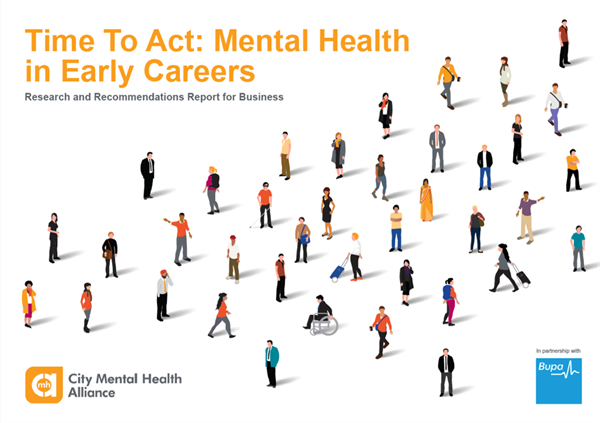A new workplace mental health research report from the City Mental Health Alliance (CMHA), delivered in partnership with Bupa, lays bare the scale, impact and causes of the mental health challenges facing young professionals* and calls on businesses to take action.
The research, based on a YouGov poll of over 1,000 young professionals reveals that 61% said that poor mental health (e.g. being anxious or stressed) has impacted their ability to do their job well and concentrate at work. One in five (20%) said this happened “all the time” or “often”, while 41% said that it “sometimes” did in the past year. More than one in four (28%)*** have had to take time off work because of poor mental health.
The research points to a devastating high incidence, with 72% experiencing poor mental health*** in the past 12 months, including consistent low mood (45%), panic attacks (24%) and suicidal thoughts (17%). One in 50 (2%) of survey respondents had sadly attempted suicide. Contributing factors to poor mental health included the pandemic, burnout because of work and eco-anxiety.
The report also shows that people in early careers want businesses to support them. 60% said that if their employer supported their mental health, it would help them to work more effectively and 66% said it would make them want to stay at the organisation. Nearly half (47%) said that, if job hunting, one of the “most important things” they would look for in that a prospective employer prioritises their mental health and wellbeing. Therefore, businesses that prioritise mental health will also benefit from improved productivity, retention and recruitment.
When asked what support they’d like to see from businesses, over half of respondents (55%) say that employers could encourage rest and recovery periods between busy times at work. Others said providing more mental health support such as health insurance cover for mental health and Employee Assistance Programme (EAPs) (33%). 79% said that having a supportive and approachable line manager has had a positive impact on their mental health.
However, mental health stigma in the workplace remains a barrier, with only 27% saying they would currently be “comfortable” using mental health services at work if they needed them. 47% said they would feel more comfortable accessing mental health support through work if there was reassurance that it wouldn’t impact their career.
The research suggests many employers are already taking action, as nearly half (49%) said their employer had supported their mental health over the past 12 months.
Farimah Darbyshire, Head of Programmes at the CMHA, said:
“This research reveals that young professionals are facing a mental health crisis. We believe that businesses have a responsibility and an opportunity to support the positive mental health of their people in early careers. Or, they can exacerbate the problem by allowing stigma and unhealthy working practices to go unchecked.”
“Our Time To Act report recommends that businesses focus on three things. Firstly, challenge the high levels of mental health stigma in the workspace. Secondly, design jobs and working practices which are healthy and avoid burnout. And thirdly, offer and signpost to wellbeing support. By doing this, businesses can help young professionals to stay healthy, thrive and fulfil their career potential. This is the right thing to do and, given the impact on recruitment, productivity and retention, it is business-critical.”
Alex Perry, CEO of Bupa Insurance said:
“Mental health is as important as physical health. That's why employers need to lead the way in supporting their people, particularly after the impact of the pandemic over the past 18 months.
“Whilst mental health issues can affect anyone, it’s clear from this research that people at the start of their careers face additional stress and challenges as they enter the workplace. It’s up to all of us to support this next generation of the workforce, many of whom will go onto becoming leaders. This is why we’ve partnered with the City Mental Health Alliance to support our joint vision to create mentally healthy workforces everywhere.”
The report also reveals a complex mix of factors which are contributing to their poor mental health, including:
- Pressures at work - 45% say that pressure to work consistently long hours has negatively impacted their mental health a lot/little in the past 12 months, while 61% said that not being able to maintain boundaries between work and personal life has had a negative impact. 60% say that work had caused them to “burnout”****.
- Mental health stigma - 43% said that trying to conceal their poor mental health from their employer had a negative impact on mental health
- Strain of the pandemic - 69% said that loneliness related to COVID-19 has had a negative impact on their mental health; 62% said that additional stress on relationships with their family or partner due to the pandemic has negatively impacted their mental health; and 38% say it heightened concerns about their personal finances
- Eco-anxiety has also had a negative impact on the mental health of young people – 59% pointed to anxiety about climate change
- Fear of failure and “unhealthy perfectionism” - 44% say that not meeting their own expectations, such as making a mistake or missing a deadline at work, negatively impacts their mental health all the time or often.
The report, entitled “Time To Act: Mental Health in Early Careers”, can be downloaded here: https://citymha.org.uk/ .
Ends
Notes to Editor
* Young professionals’ – Aged 20—26, working in an office-based environment for up to four years since completing education. Due to the COVID-19 pandemic, many will have been working remotely throughout this period.
** 20% took sick leave due to poor mental health and a further 8% took the days off as annual leave
*** A small number of those asked (2%) chose not to respond to the question under GDPR.
**** Burnout - “a state of emotional, physical, and mental exhaustion caused by excessive and prolonged work stress”
YouGov
All figures, unless otherwise stated, are from YouGov Plc. Total sample size was 1,014 adults. Fieldwork was undertaken between 30th July - 23rd August 2021. The survey was carried out online. The figures have been weighted by age, region and ethnicity.
We surveyed people working in traditional office environments, often referred to as ‘desk jobs’, though many respondents would have worked remotely throughout the pandemic. This included respondents from a range of different industries, drawing a focus on professional services, legal, financial, banking and technology. All respondents had worked in an office-based environment for no longer than 4 years. The sample also included a spread of responses across sector and organisation size.
CMHA
The City Mental Health Alliance (CMHA), a not-for-profit membership organisation, believes that businesses have an opportunity and a responsibility to protect, support and create positive mental health for their people so that they can thrive. The CMHA brings together senior leaders, HR, wellbeing and D&I professionals from business, along with mental health experts, people with lived experience and industry partners to share and capture knowledge of what does and doesn’t work in workplace mental health.
Based on this knowledge, the CMHA has developed and offers annual assessments that give managers a roadmap to building a healthier culture; strategic roundtables that help solve workspace mental health issues from the top down; and step-by-step guidance that helps fuel changemakers to make a lasting impact. Members include Bupa, Goldman Sachs, HSBC, Lloyds Banking Group, PwC and Linklaters.
About Bupa Global, India and UK
Bupa's purpose is helping people live longer, healthier, happier lives and making a better world.
Health insurance accounts for a large part of our business with Bupa UK Insurance, the UK’s leading health insurer, providing health insurance to 2.3 million people. Bupa Global is the premium health insurance arm of Bupa, serving 490,000 customers around the world. Bupa Dental Care is the leading provider of private dentistry in the UK, providing dental services in 488 centres across the UK and Ireland. Bupa Care Services has around 6,000 residents in over 120 care homes, and 10 Richmond care villages. Bupa Health Services comprises 50 health clinics, and the Cromwell Hospital in London which provides care for insured, self-pay and international patients. Bupa directly employs around 23,000 people in the UK.
Bupa Global is the premium health insurance arm of Bupa. Established in 1971, it provides individuals, small businesses and corporate customers international coverage with products and services so they can access the healthcare they need anytime, anywhere in the world, whether at home or when studying, living, travelling or working abroad.
Niva Bupa (formerly Max Bupa until 2021) is a specialist health insurer in India. Established in 2010, it is a joint venture between Bupa and True North, a leading Indian private equity firm. Niva Bupa offers a comprehensive suite of health insurance products and services to individuals and families through multiple distribution channels, making it one of the leading health insurance and medical companies in India.
GDPR
We work for charities, public bodies and health brands. We have obtained your contact details from Roxhill media database and use this information, as well as any other information you give us, in accordance with our Privacy Policy. We are contacting you today about our client, the City Mental Health Alliance. If you do not wish to be contacted by us, please let us know by replying to this email and we will delete your details from our records.





